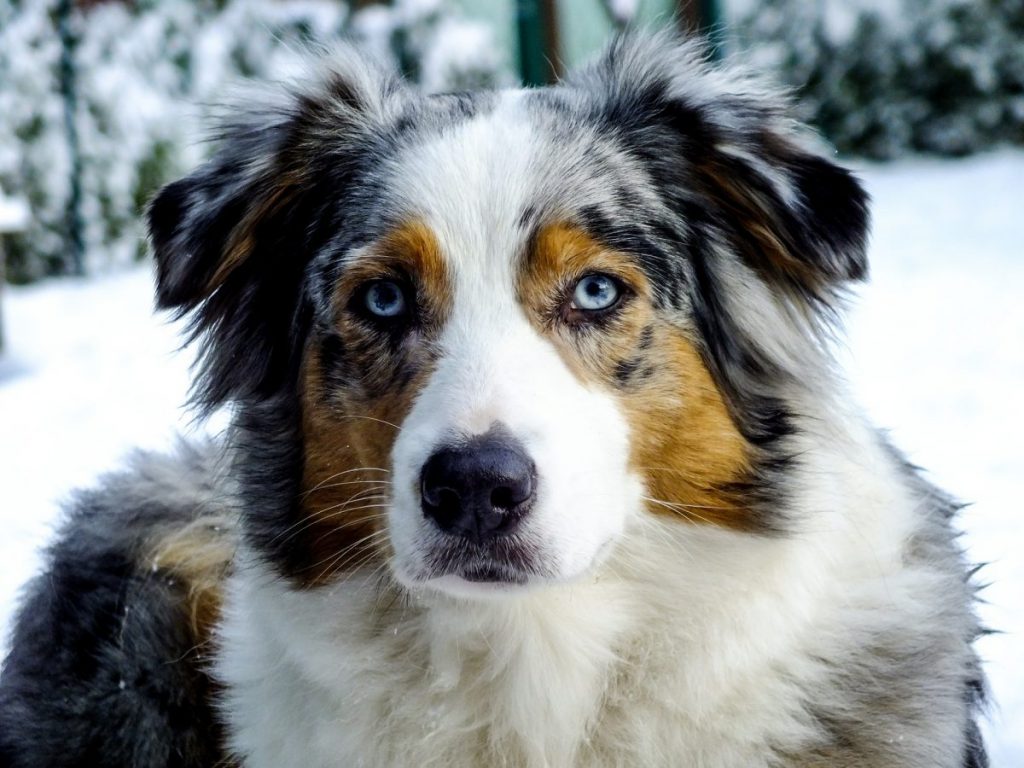Bronchitis is a disease that manifests itself in dogs similarly to bronchitis in people, with similar causes, symptoms and treatment. Understanding bronchitis in dogs will help you notice the signs and symptoms and get your doggy taken care of.
What is Canine Bronchitis?
Bronchitis affects the smaller airways in a dog’s respiratory system, called bronchi, which are responsible for the transport of oxygen through the dog’s airways. If a dog is suffering from bronchitis, their airways will be inflamed and filled with secretions, which makes it harder to get air through. The walls of the bronchi will swell and narrow the airways, the passage of oxygen will be blocked by mucus or other secretions. Canine bronchitis is also known as chronic obstructive pulmonary disease.
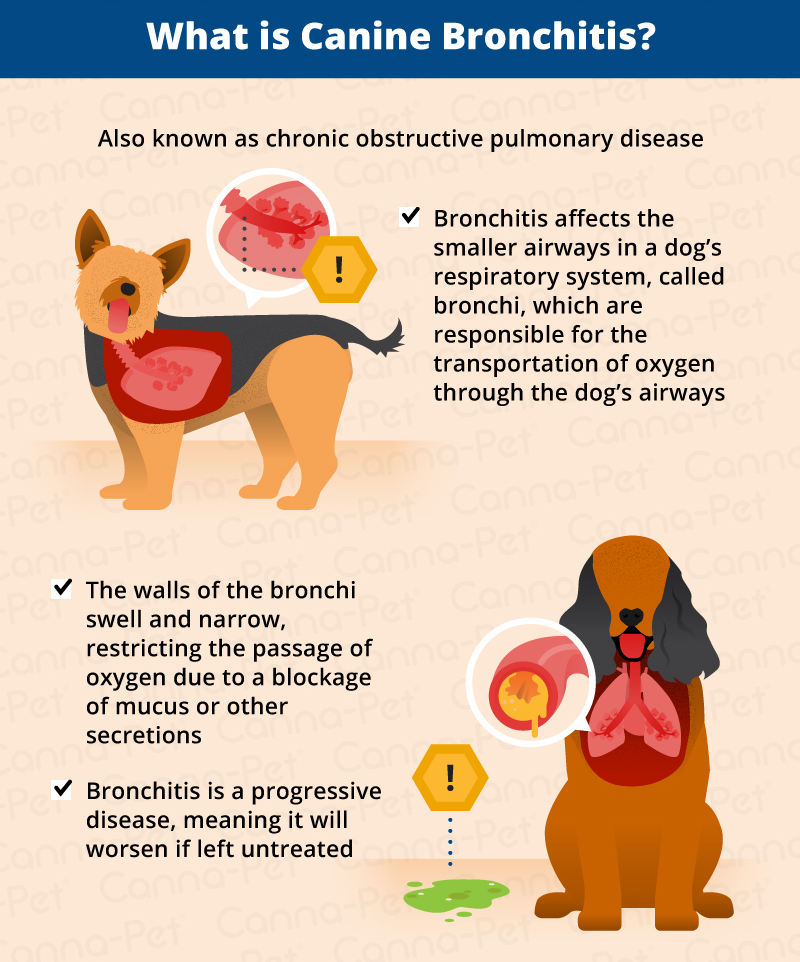
Chronic Bronchitis
Chronic bronchitis is when the disease lasts for longer than two months. The causes of chronic bronchitis are more difficult to identify than acute bronchitis, but this longer-lasting disease can be the result of genetic disorders. Chronic bronchitis is also more serious long-term because it may result in permanent damage of a dog’s respiratory system. Unfortunately, it may not be possible to “cure” chronic bronchitis, but it is possible to limit the symptoms and make your dog more comfortable.
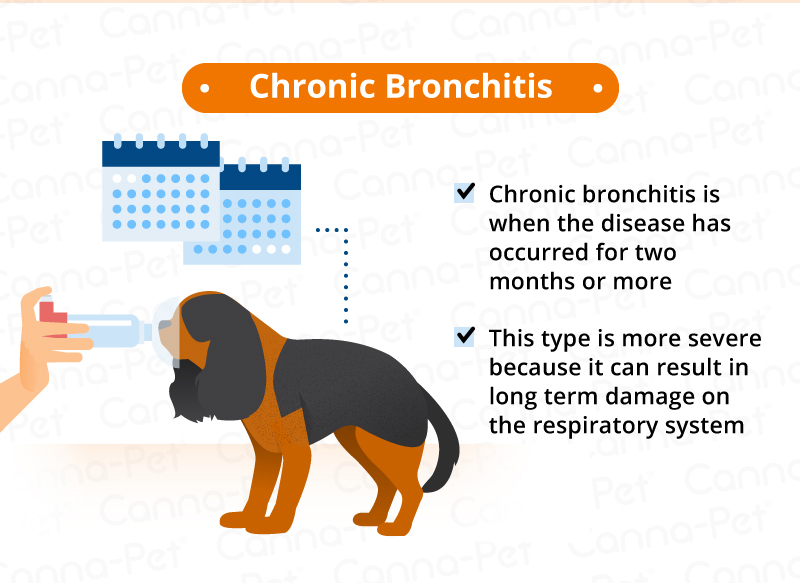
Acute Bronchitis
Acute bronchitis has a shorter duration, usually a few weeks. Acute bronchitis can be caused by:
- Bacterial infections
- Allergies
- Parasites (such as heartworm)
- Progression of asthma
- Airborne fumes (smoke, dust, air fresheners, etc.)
- Genetic reasons
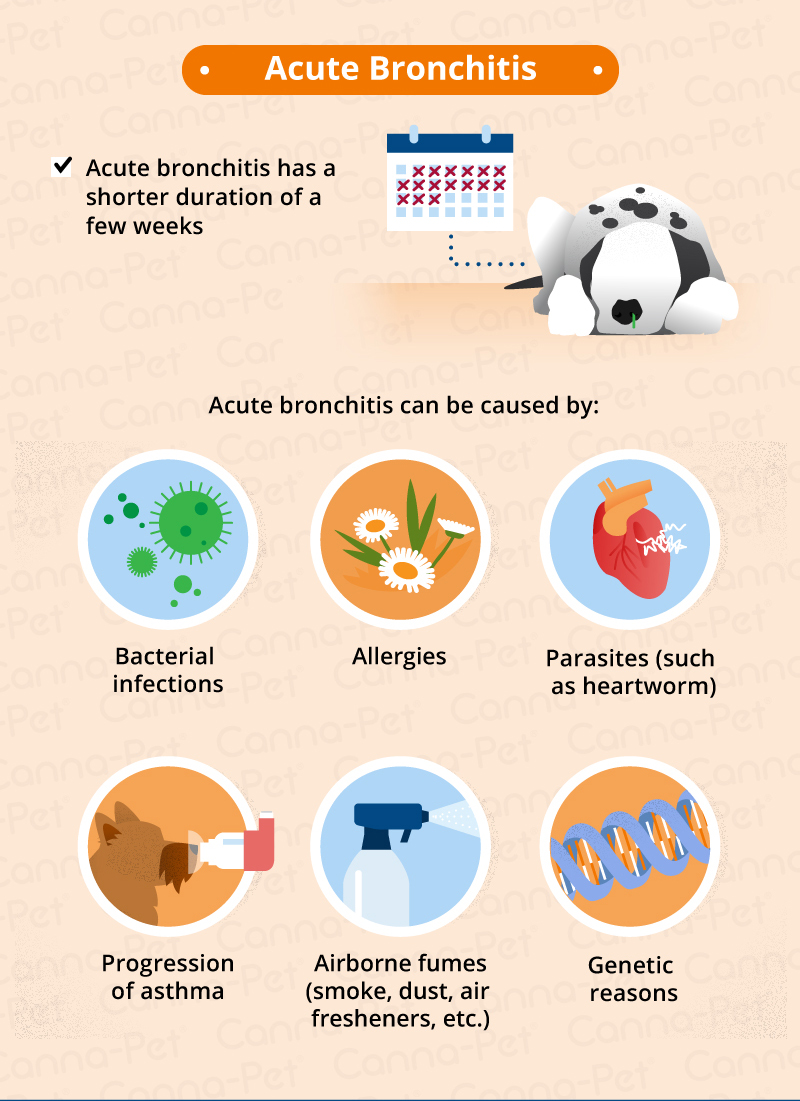
Symptoms of Canine Bronchitis
Just like bronchitis in humans, the symptoms of bronchitis in dogs include:
- Coughing
- Wheezing or other abnormal lung sounds
- Difficulty breathing
- Vomiting or retching
- Gagging
- Loss of consciousness
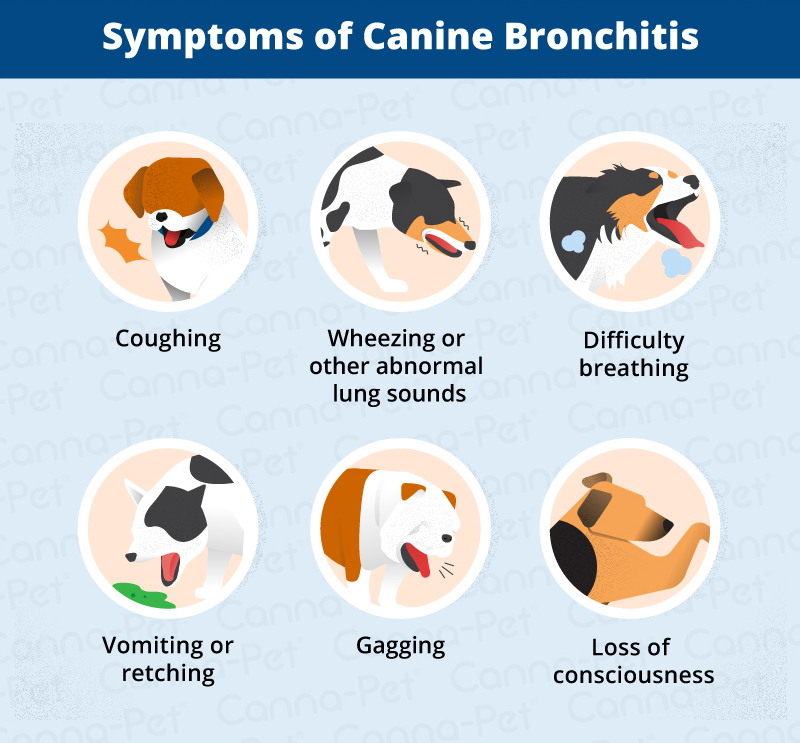
Some dogs suffering from bronchitis may also be more lethargic and averse to exercise. Although these symptoms aren’t exclusive to bronchitis, and may be found with other diseases, they are red flags to look for if you suspect that your pup might be suffering with this serious disorder.
Bronchitis is also what health professionals call a progressive disease, meaning that it can get worse if not treated early. The good news, though, is that if the bronchitis is treated early and effectively, most dogs can live an otherwise healthy life. Especially if the cause of the symptoms is environmental, it can be easy to take steps to ensure you have a happy, healthy pup.
Bronchitis is mostly seen in toy breeds, such as Terriers, Cocker Spaniels, Yorkies, and Pomeranians. This may be the result of excessive breeding or smaller chest cavities. That being said, though, bronchitis can be found in larger dog breeds, as well. In addition, older dogs and overweight dogs are more likely to develop bronchitis.
If you believe your dog has bronchitis, take them to the vet to confirm and take steps to reduce the symptoms. At the vet, expect them to take a chest X-ray to look for inflammation and liquid in the airways. The vet will also likely ask about your dog’s symptoms, past health issues, current diet and exercise, and more. These are all factors that will influence their recommendations for further care.
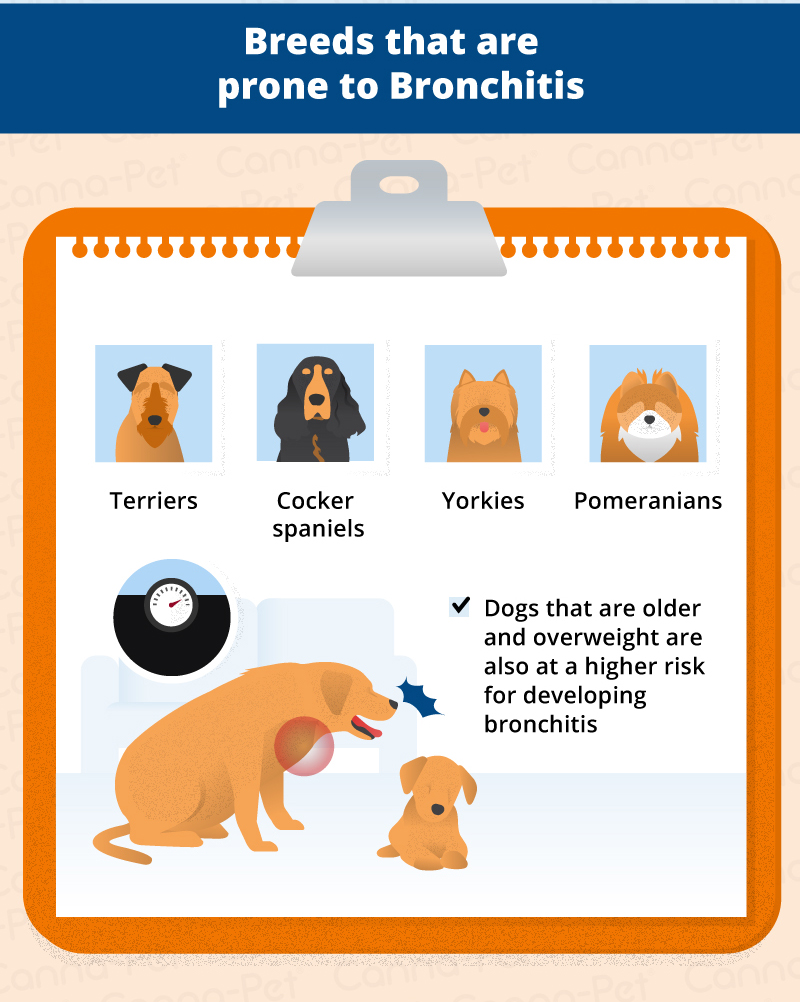
Treatment of Bronchitis in Dogs
Depending on the reason and type of bronchitis diagnosed, your vet may recommend changes in the dog’s environment. For example, if your dog is diagnosed with acute bronchitis caused by irritation, you may want to limit the use of perfumes, insecticides, or cigarettes. It may also be beneficial to do a deep clean of the home, eliminating dust, pollen or other irritants. Humidifiers, air purifiers, or diffusers might help.
If your dog is overweight or otherwise unhealthy, the vet may recommend a change in diet and exercise. Speaking of exercise, most vets recommend using a harness rather than a collar on dogs recovering from bronchitis because collars can irritate the throat, especially if the dog usually pulls on the leash.
In addition, there are more natural solutions that might interest owners looking for an organic way to help their furry friend. Coupage is a type of massage that therapists can implement to help clear the area and alleviate the bronchitis symptoms. This massage can loosen some of the phlegm or other secretions that exasperate bronchitis.
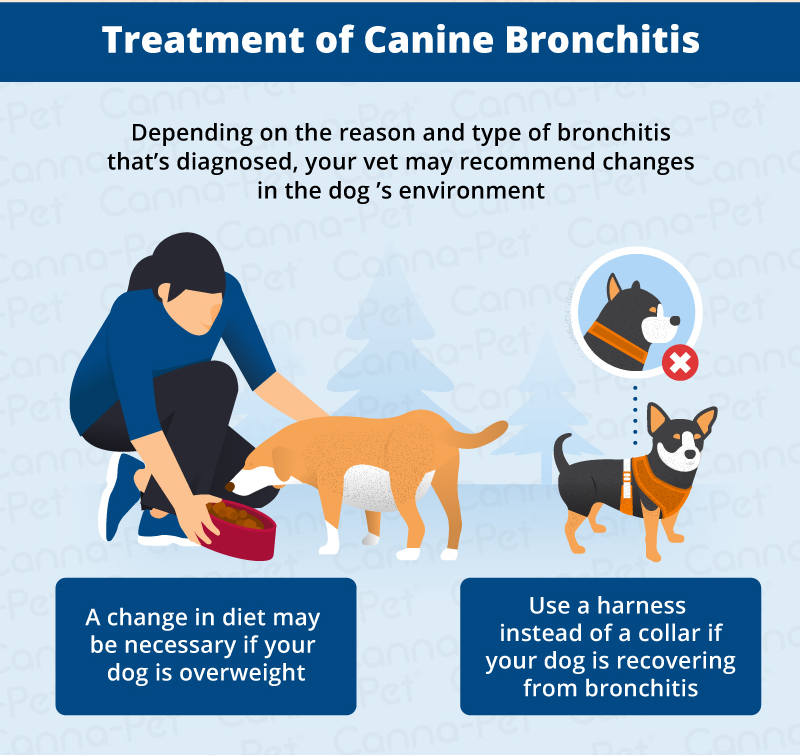
Sources:
- “Bronchitis in Dogs – Symptoms, Causes, Diagnosis, Treatment, Recovery, Management, Cost.” WagWalking, 28 Oct. 2016, Accessed 26 Feb. 2017. www.wagwalking.com/condition/bronchitis.
- “Tracheobronchitis (Bronchitis) in Dogs – Dog Owners.” Veterinary Manual, Accessed 26 Feb. 2017. www.msdvetmanual.com/dog-owners/lung-and-airway-disorders-of-dogs/tracheobronchitis-bronchitis-in-dogs.
- Clark, Mike. “Bronchitis In Dogs: Symptoms, Causes, & Treatments.” Dogtime, 12 Jan. 2018, Accessed 26 Feb. 2017. www.dogtime.com/dog-health/54845-bronchitis-dogs-symptoms-causes-treatments.
- “Symptoms and Signs of Bronchitis in Dogs.” Petwave, 30 Aug. 2016, Accessed 26 Feb. 2017. www.petwave.com/Dogs/Health/Bronchitis/Symptoms.aspx.
- “Causes and Prevention of Bronchitis in Dogs.” Petwave, 30 Aug. 2016, Accessed 26 Feb. 2017. www.petwave.com/Dogs/Health/Bronchitis/Causes.aspx.

